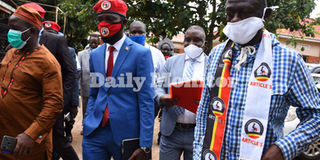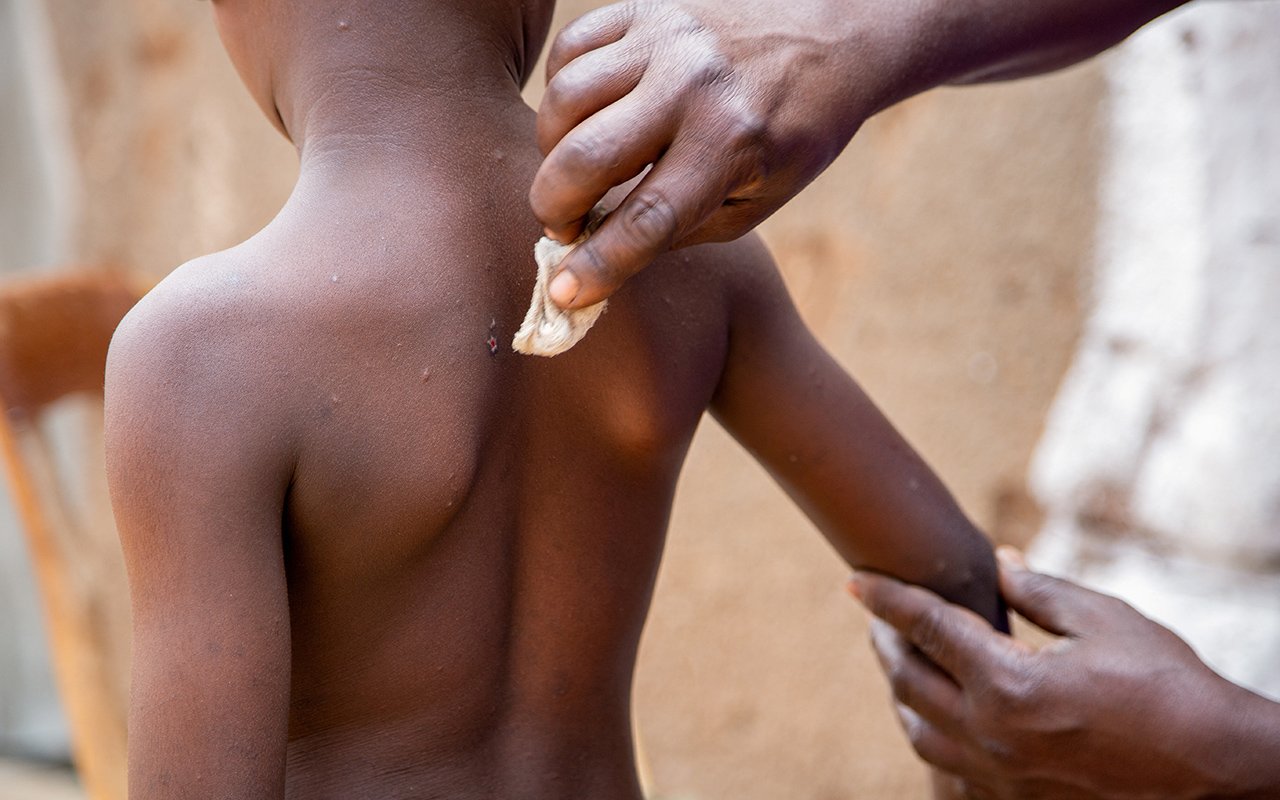Prime
Museveni wants reconciliation with Opposition, but how will he do it?

L-R: Opposition leaders Asuman Basalirwa (JEEMA), NUP’s Robert Kyagulanyi, Kampala Lord Mayor Erias Lukwago and former FDC president Kizza Besigye after they formed the United Forces of Change last year. PHOTOS | ALEX ESAGALA | FILE
What you need to know:
- In his acceptance speech on January 16, President Museveni indicated that he would be initiating talks with sections of the Opposition. But NUP, which is set to become the biggest Opposition party in Parliament, has yet to out any terms under which it might engage Mr Museveni. FDC’s position has always been that any dialogue must have a definite agenda and discuss a transition from Museveni/NRM.
Early on the evening of January 16, Mr Museveni in a televised address from his country home in Rwakitura, Nyabushozi County, indicated that he would be initiating talks with sections of the Opposition.
“The important thing is to maintain peace so that any dialogue is peaceful and meaningful. Actually, we have contacts with some of these groups, we can talk. Whatever divisions we have, we shall talk,” Mr Museveni declared.
The declaration came a few hours after the Electoral Commission (EC) declared winner of the January 14 polls which have been arguably the most violent since 1996 when Uganda held its first direct presidential elections.
The campaigns ahead of the race in which Mr Museveni’s main challengers for the top job were Mr Robert Kyagulanyi, alias Bobi Wine, of the National Unity Platform (NUP), Mr Patrick Oboi Amuriat of the Forum for Democratic Change (FDC), and Maj Gen Mugisha Muntu of the Alliance for National Transformation (ANT), were marred by the violent arrests on several occasions of both Mr Kyagulanyi and Mr Amuriat. Police fired teargas and live ammunition in order to break up many of their rallies.
Protests broke out in Kampala on November 18 and 19 after the arrest in Luuka of Mr Kyagulanyi, who the police accused of flouting regulations aimed at curbing the spread of Covid19. At least 54 people are estimated to have been killed during skirmishes between protestors and security forces.
Mr Museveni reiterated his commitment to reaching out to the Opposition while speaking at Entebbe during celebrations to mark the 35th anniversary of the National Resistance Army’s victory. He said he was ready to reconcile with those with divergent views.
“That (reconciliation) is our way to do things. That is how you find that Idi Amin’s son is my deputy Director of Intelligence and when you see Taban, you can see that Idi Amin is around,” Mr Museveni said.
“So really for us we do not have much problems (with reconciliation). We have the mouth and we use it to talk. The only thing we shall not tolerate is violence. This is the minimum. Violence, intimidation and cheating are not allowed. Let everybody maintain peace, everything will move in a positive direction,” Mr Museveni said.
Timing
The timing of the announcement came at a time when insiders believe that Mr Museveni is at his weakest and most vulnerable.
A source close to State House suggested that despite the fact that he had clawed into the Opposition’s territories in Kasese, West Nile and Acholi, the increase of the Forum for Democratic Change (FDC’s) influence in Teso, and the loss of Busoga and Buganda votes had left him unruffled.
Mr Museveni was beaten in Buganda with a margin of 614,677 votes. He garnered 838,858 votes against Mr Kyagulanyi’s 1,453,535 votes. It was the first time since 1996 that he lost the Buganda vote.
The NRM also lost at least 10 parliamentary seats that it has been holding, including that of the Vice President, Mr Edward Kiwanuka Ssekandi, to Mr Kyagulanyi’s NUP (NUP).
In Busoga, Mr Museveni got 404,862 votes, while Mr Kyagulanyi got 437,059 Votes. Mr Kyagulanyi won with a margin of 32,197 votes. Mr Museveni won in only three out of the region’s 11 districts. He won in Buyende, Kaliro and Namutumba, but suffered reversals in Kamuli, Luuka, Iganga, Jinja, Bugweri, Bugiri, Namayingo and Mayuge districts.
The NRM also lost seats like the Jinja South West and Jinja North constituencies to FDC and the Jinja City Woman seat to NUP. Constituencies like Butembe County and Iganga Municipality went to Independent candidates.

President Museveni
Urgency
Mr Magode Ikuya, an NRM historical and former Director for Mass Mobilisation at the Movement Secretariat, argues that Mr Museveni’s defeats in Buganda and Busoga suggest that it is high time people inside the NRM returned to the drawing board and carry out widespread consultations to determine the next course of action.
“The Baganda have said certain things. So how do you operate governance in Buganda when the political thinking is the way it is? If we are not able to persuade then it means the politics has either collapsed or the idea. So there is need for a change in either the message or the idea. The message is either not there or it is packaged wrongly,” Mr Ikuya argues.
Not soon
However, despite the apparent need to engage as a matter of urgency, Mr Onapito Ekomoloit, a former presidential press secretary and MP for Amuria County, does not believe that Mr Museveni will be driven to quickly work on it.
“Engaging NUP immediately would portray panic on the part of the President, something which he certainly would not want to show even if he were in a state of panic. If there are any talks, I think they will be held sometime in future,” Mr Ekomoloit says.
What kind talks?
Whatever the time he chooses to get onto the discussion table with his opponents, the biggest talking point will be about the kind of engagement that they will have. Mr Museveni has never been the type to engage in a structured dialogue. This dates back to the early years in office.
In the paper, An Insider’s View of How NRM Lost the Broad-base, which he authored in 1999 setting off a chain of events which culminated in breaking ranks with the NRM and rising to become the face of the Opposition until last year when he announced that he would not contest the 2021 elections, Col Dr Kizza Besigye revealed that the NRM set up a committee headed by the late Eriya Kategaya, to engage the various groups, but the discussions were never taken forward.
“It would appear that once the leaders of the political parties were given ‘good’ posts in the NRM government, their enthusiasm for the discussions waned, and the process eventually fizzled out,” Dr Besigye wrote.
The NRM never tried to make Mr Kategaya’s commission work. It never facilitated any processes that could have facilitated a structured way of engaging the parties, preferring to deal with individuals and not the political parties that they belonged to.
That practice continued into Mr Museveni’s fifth term when he picked on Ms Nakiwala Kiyingi and Ms Sarah Kanyike from the Democratic Party (DP) and Ms Beti Olive Kamya from the Uganda Federal Alliance (UFA) for appointment to his Cabinet.
He also appointed Ms Betty Amongi, the wife of the leader of the Uganda Peoples Congress (UPC) faction led by Mr Jimmy Akena, a minister and named the former MP for Kole, Ms Joy Ruth Achieng, High Commissioner to Canada. The former national chairman of DP, Muhammed Baswari Kezaala, became Deputy High Commissioner to India.
If what the former spokesperson of UPC, Mr Michael Osinde, told Sunday Monitor some time back is anything to go by, it is only UPC that has a semblance of a formal understanding with Mr Museveni and the NRM.
“We (NRM and UPC) drafted something which one of the parties did not ascent to. Our (UPC) cabinet had issues with some provisions of the Memorandum of Understanding (MoU). They approved that part on Betty Amongi taking the Cabinet job, but did not approve the formal working relationship with the NRM,” Mr Osinde said.
Mr Yona Kanyomozi, a former minister of Cooperatives and Marketing during the Obote II regime and member of UPC, however, says the MoU does not exist.
“He has an MoU which nobody has seen. What I think is there is an agreed position of saying you do not cause me trouble I am more interested in keeping my position in Parliament and keep my office in Uganda House. I will also not cause you any trouble. Most of my MPs also want to keep their seats. The issue of the party is secondary to keeping their seats,” Mr Kanyomozi told Sunday Monitor.
Why would Mr Museveni wish to continue operating in that way?
Prof Sabiiti Makara, a lecturer of Political Science at Makerere University, believes that Mr Museveni has never been interested in engaging in any meaningful talks because he believes that “the winner takes it all”.
“This government is not interested in talks. Most times they send junior officers. When the senior officers show up they speak with so much arrogance that it scuttles the talks,” Prof Makara says.
“Mr Museveni’s engagements, such as when he attended the May 2019 summit of the Inter-Party Organisation for Dialogue (IPOD) are no more than public relations’ exercises aimed at lending the NRM credibility,” Prof Makara adds.
The NRM has no record of going through with the things that it agrees on with other parties.
“Most of their (political parties) recommendations have never been implemented. It (IPOD) does not serve its purpose. It only serves as a legitimisation tool for the NRM,” Prof Makara says.
Mr Museveni never made mention of any agenda. NUP, which is set to become the biggest Opposition party in Parliament, has also yet to out any terms under which it might engage Mr Museveni, but FDC’s position has always been that any dialogue must be “on clear terms”, have a definite agenda and discuss a transition from Museveni/NRM.
The perceived lack of clarity on how he intends to proceed is according to sources close to State House aimed at keeping the Opposition guessing, but it should not be for so long says Mr Ikuya.
“They no longer convene political meetings, but this should happen very fast because what happened in Buganda might happen in Bunyoro. There is need to understand the underlying issues. If we do not someone will come up and claim to have solutions and before you know it he will have overwhelmed you. Amin came up with 18 points. How long did it take to get rid of him?” Mr Ikuya said on phone.
The sense of urgency in his voice is unmistakable. One wonder whether those who read his statement understand its deeper impact.




